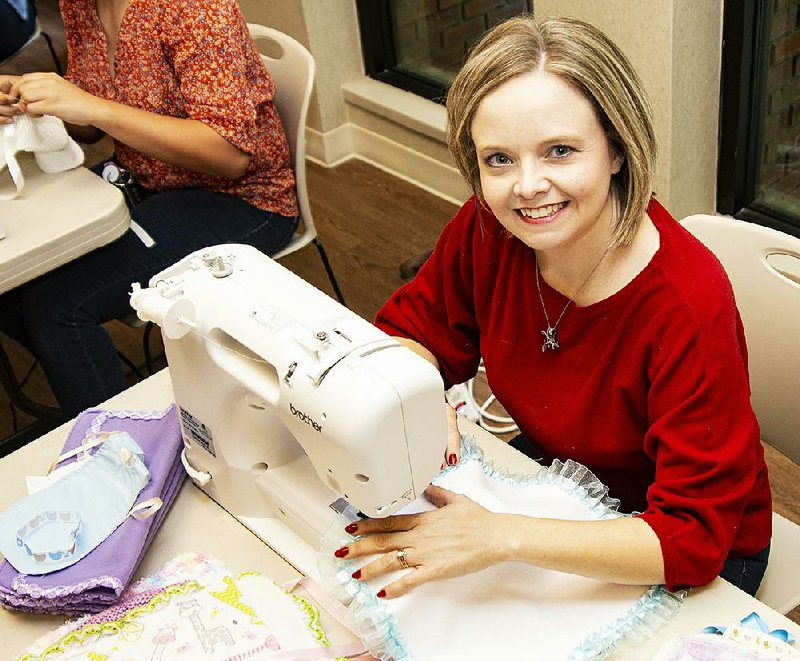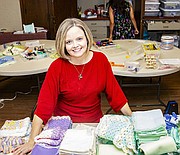On one Sunday afternoon, the parish hall at Our Lady of the Holy Souls Catholic Church is a hive of activity. Tables are covered with colorful fabrics, ribbons, bags of little stuffed bears, boxes of knit hats.
All are being assembled by a group of women and a few young girls matched together into colorful layettes for babies.
But if you stop and look, you notice how tiny everything is -- smaller, even, than most doll clothes.
These layettes have a very special purpose and every month, the volunteers of Holy Sews gather for a workday, where they assemble, package and mail hundreds of layettes to hospitals all over the country for stillborn premature infants or for premature babies in palliative care.
As founder Regina Binz says, the purpose is so the families "can have some happy memories, pretty pictures with their baby."
On a workday, they'll send out as many as 500 layettes to more than 400 hospitals around the country -- at least two in each state -- that order the kits. How are they able to put so many pieces together and accomplish so much?
The answer is simple: faith and science.
Binz, who specializes in cytogenetics at the University of Arkansas for Medical Sciences's pharmaceutical sciences department, combined her own experience with loss and her passion for her laboratory career to create a well-oiled, compassionate machine.
"I'm a lab person," she says. And she has applied her training to Holy Sews. "I've standardized every step."
Everything is uniform and made to be a standard size and to fit a pattern. And just like in a lab, the people working all know and understand the full process, but each person takes responsibility for one step, whether it's cutting fabric, tying ribbons or sewing a tunic.
Each piece is inspected carefully at each step, and every step is vital to keeping the layettes moving. The people working those steps take great care and pride in their work.
While Binz created the process, it has been a lesson in letting go.
"I realized when you're in charge of something this big, the best thing is for you to realize that you're not really in charge. This whole ministry has a life of its own, even though I defined the black-and-white lines."
Because even if the process has been carefully plotted out, there's always the human element.
For instance, they only wanted certain colors and very traditional-looking fabrics and yarns for the layettes, yet some outside-the-norm pieces were donated. Then, when Binz took a pink leopard-print layette to a hospital in San Francisco, the nurse said, "Oh, thank God you brought something nontraditional!"
"We learned to just trust the spirit and not to make those black-and-white judgment calls. If it comes together, it comes together, and we send it out with faith."
Holy Sews is a project born out of loss and compassion. Binz herself delivered and lost a son at 17 weeks in 2007. When he was brought to her, he'd been carefully cleaned and wrapped, but the clothes were too big.
As her son's original due date approached, Binz was dealing with very difficult emotions. Her mother's extension homemakers group sewed layettes for premature and stillborn babies, and Binz helped with that. But the garments, Binz learned, were again too big. So, she went to the drawing board and asked doctors and nurses she knew for their input.
Working with others at her church, Holy Souls, she eventually came up with the new mission project, but naming it proved tricky. Binz says she fought the urging of others to name the project after her son, Ryan.
"I wouldn't want to dress my child in clothes named after someone else's baby," she says. "It just didn't seem right."
When the name Holy Sews came to her -- a play on Holy Souls and a reference to the Holy Spirit that drives everything -- it seemed perfect.
The babies placed in Holy Sews clothes aren't like typical full-term babies, and it's not just their small size. The skin isn't fully formed. They're particularly fragile. So, the pieces have no metal fasteners that can tear tender skin. No sleeves so they're easier to put on. There's a hood at the back for extra support and also to cover the head if the hat is too big.
The result is a matched set of tunic, wrap and blanket that nurses can use to dress the baby and present him or her to the family.
Binz remembers the shock of how her son looked when he was brought to her. The carefully designed, tiny, color-coordinated layettes help mitigate that shock and show that someone cares.
"That's a baby you've loved and dreamt about maybe all your life but definitely since you got the pregnancy test results."
By providing a variety of colors and fabric patterns, Binz says, they're doing more than just clothing the tiny bodies. They're helping the families through a very difficult process.
"At a time when [families] have no choices, letting them choose what they will photograph their baby in, what they say hello and goodbye in, it has a huge impact."
It's a boon for the nurses as well. Most hospitals don't have the budget to buy garments like these. Without the complete kits, they have to struggle to find pieces that will work -- anything to help a grieving family. Holy Sews has everything they need in one neat -- free -- package.
Binz has visited many hospitals around the country and, she says, "I've had multiple experiences where the nurses just cried because they don't believe it."
There are now three chapters of Holy Sews: Little Rock, Dallas and upstate New York, as well as a smaller satellite chapter in Hot Springs Village that sews but doesn't ship or package, and individual sewers scattered around.
Postage is their big expense and they can always use monetary donations to support their work. But, what Binz really hopes to get are more chapters around the state and the country. The packaging and mailing is a big task -- almost too big for the two part-time employees (funded by a grant from the Moody Methodist Foundation) and volunteers. Expanding to other chapters would, she believes, increase the financial donations as well as take some of the packaging and mailing burden off the Little Rock chapter.
The rewards and the mission aren't just helping those families out there in the world. The people who work putting the kits together are helped too. For people who haven't been through the premature loss of a baby, Binz says, it's difficult to understand.
Today, with advanced technology such as ultrasounds, people are getting attached to their unborn children far earlier, even before they can hear a heartbeat. When that child is gone, it's a devastating loss.
"The line that we all walk along, the fine line between life and death, is love," Binz says. "And those of us who have had that line crossed inside our bodies, it's very real."
That's something volunteer Dr. Kris Patterson can relate to. One of her twin sons died in utero 14 years ago at 20 weeks gestation.
"When we were going through the loss, nobody understood what we were going through," she says. "There wasn't a support system."
Because of her experience, she says, she had always hoped for a way she could be there for others.
Then, one day, Binz met Patterson's husband, Dr. Cam Patterson who is chancellor of UAMS, and gave him her card. The next day, the two women were emailing each other.
"It's through helping other people that you find your own sense of healing," Patterson says. "Any person who has lost a child at any phase would benefit."
Many of the women who help have experienced loss. Some have miscarried. Some have lost a grandchild or a niece or nephew. Some women are elderly and had a stillbirth decades ago when people just didn't talk about such things.
"Participating in something like this has allowed them to pull it out from under the rug and talk about it," Binz says. "I think it's an empowering thing for a grieving woman to do this."
It's not a group that requires a commitment. Some women come just once.
Patterson says, "Nobody ever asks, 'Why are you here? Why is this important to you?' Everybody is welcomed with open arms."
"You've gone through this and you feel isolated," Binz says. "Nobody's going to understand the way you feel. There's been multiple times we've met someone at the door and they've just stood there in tears. And we give them a hug and they're instantly family."
Most of the time, they never know who received the layettes or whose lives they've touched. They just send them out with faith that it will help families in their darkest times.
Binz says, "Even though we don't ever physically touch these people or get to talk to them, every package has so much love go into it, it's like a hug to them. We're crawling into the valley of the shadow with them is how we feel -- because we've been there."
For more information visit holysews.org.
High Profile on 10/27/2019

